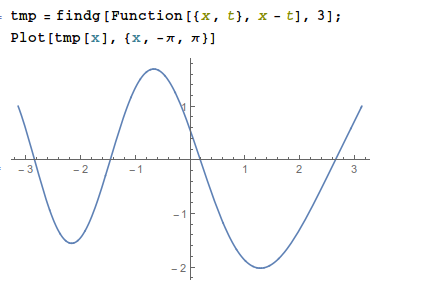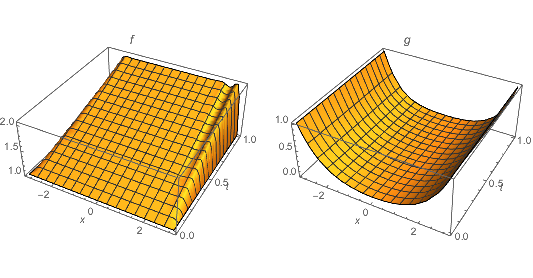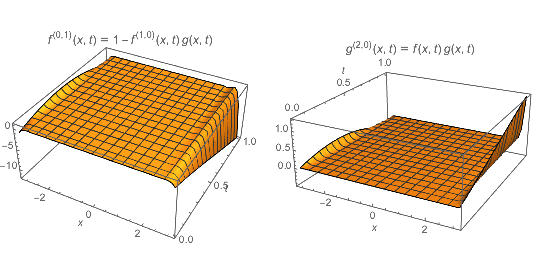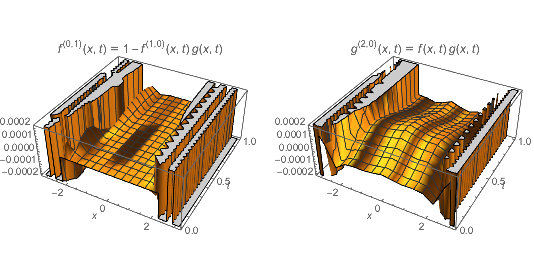Say I want to solve the following set of PDE's (my actual equations are way more complicated, this is just a simplified example to show the structure): $$\begin{align} \partial_t f(x,t)&=1-g(x,t)\partial_x f(x,t)\\ \partial_{xx} g(x,t)&=g(x,t)f(x,t) \end{align} $$
with boundary + initial conditions $$ \begin{align} f(x,t=0)&=1& f(-\pi,t)&=f(\pi,t)=1 & g(-\pi,t)&=g(\pi,t)=1 \end{align} $$
Note that $g$ does not have an equation which contain a time derivative, but rather at each time step it is assumed to satisfy a spatial ODE. For example, at $t=0$ it satisfies the equation $$g''(x)=g(x)\qquad g(\pi)=g(-\pi)=1$$ whose solution is $$g(x,t=0)=\frac{\cosh(x)}{\cosh(\pi)}\ .$$ Note that this initial condition for $g(x,t=0)$ was not specified in the problem definition as it can be inferred from the other conditions.
If I just feed these equations to Mathematica (version 10.4.1 for Linux), I get an error message:
NDSolve[{
D[f[x, t], t] == 1 - D[f[x, t], x] g[x, t],
D[g[x, t], x, x] == g[x, t] f[x, t],
f[x, 0] == 1,
f[-π, t] == f[π, t] == 1,
g[-π, t] == g[π, t] == 1
}, {f, g}, {x, -π, π}, {t, 0, 1}]
So I thought of a workaround - to define a function that accepts $f(x,t)$ as an input and spits out the solution to the spatial ODE that $g$ satisfies:
findg[f_, t_] := gt /. First@NDSolve[{
gt''[x] == gt[x] f[x, t],
gt[-π] == gt[π] == 1
}, gt, {x, -π, π}]
This function works great, as you can see here:
However, I can't find a way to feed this into NDSolve. Running this
NDSolve[{
D[f[x, t], t] == 1 - D[f[x, t], x] findg[f[x, t], t],
f[x, 0] == 1,
f[-π, t] == f[π, t] == 1,
}, f, {x, -π, π}, {t, 0, 1}]
gives an error message:
I think what happens is that the outer NDSolve does not pass a function to findg but rather the evaluated function at x,t. Any hints on how to solve this (or NDSolve this :)) would be much appreciated.







f[x, t]that is passed tofindgbyNDSolveis a number, not a function, so thef[x, t]insidefindgis something like1.[x, t], which leads to the error message. Andfby itself is a symbol, not a function, so callingfindg[f, t]won't work either. (Not sure how to work around it...) $\endgroup$HoldandReleaseand the like? $\endgroup$